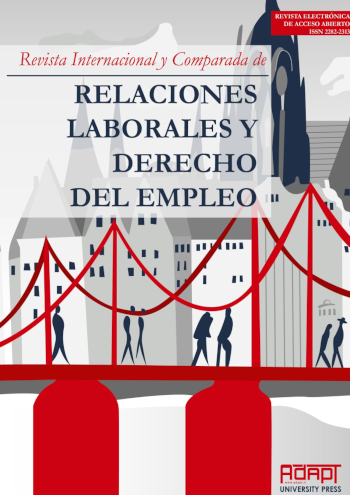Resumen
El objetivo de este trabajo es reflexionar sobre los posibles legados para el derecho laboral de la crisis actual en la que nos encontramos, cuál es el estado de calamidad resultante de la pandemia del nuevo Coronavirus (SARS-CoV-2). Para ello, este artículo se organizó en capítulos. Este artículo, en el § 1, busca llevar el concepto de teletrabajo en derecho comparado en un período pre-Covid-19 y después de sintetizar el contexto en el que nos insertamos, impregnado por reglas transitorias y excepcionales. Y, luego, cada uno de los siguientes párrafos presenta los nuevos riesgos y problemas laborales en el teletrabajo sin regulación efectiva, como el tiempo de trabajo y el no trabajo, los instrumentos laborales, los accidentes domésticos, entre otros, y las consideraciones para un nuevo teletrabajo efectivamente regulado, como una de las nuevas formas de trabajo siendo la nueva normalidad, y la necesidad de negociación colectiva como medida de prevención de riesgos y garantía de efectividad del nuevo régimen jurídico. La era digital trajo instalaciones y un mayor acceso a la información, pero al mismo tiempo el trabajador se convirtió en esclavo de nuevos recursos tecnológicos. Es necesario extender la tutela a los trabajadores del derecho laboral. Se presentan los puntos principales de la relación laboral en el teletrabajo, así como un conjunto de oportunidades y amenazas que puede plantear al trabajador como ausencia de desconexión. Para ello, se exponen los conceptos mencionados para delimitar su noción y, más adelante, demostrar los problemas que entraña, justificando el presente debate debido a las nuevas formas de trabajo e instrumentos de trabajo a distancia y su aplicación en el ámbito del trabajo.The aim of this work is to reflect on the possible legacies for labour law of the current crisis in which we find ourselves, what is the state of calamity resulting from the pandemic of the new Coronavirus (SARS-CoV-2). This article, in the § 1, seeks to carry the concept of telework in comparative right in a pre-Covid-19 period and after synthesizing the context in which we insert ourselves, impregnated by transient and exceptional rules. And, then, each of the following paragraphs presents the new risks and labour problems in telework without effective regulation, such as working time and non-work, work instruments, domestic accidents, among others, and considerations for a new telework effectively regulated, as one of the new forms of work being the new normal, and the need for collective bargaining as a risk prevention measure and ensuring the effectiveness of the new legal regime. The digital age brought facilities and greater access to information, but at the same time the worker became a slave to new technological resources. It is necessary to extend protection to workers under labour law. The main points of the employment relationship in telework will is presented, as well as a set of opportunities and threats that can pose to the worker as a lack of disconnection. To this end, the mentioned concepts are set out to define their notion and, later, to demonstrate the problems involved, justifying this debate due to new forms of work and tools of remote work and their application in the field of work.

